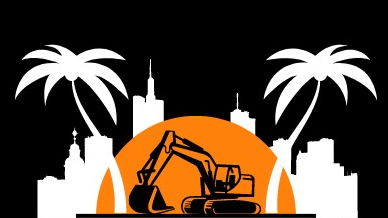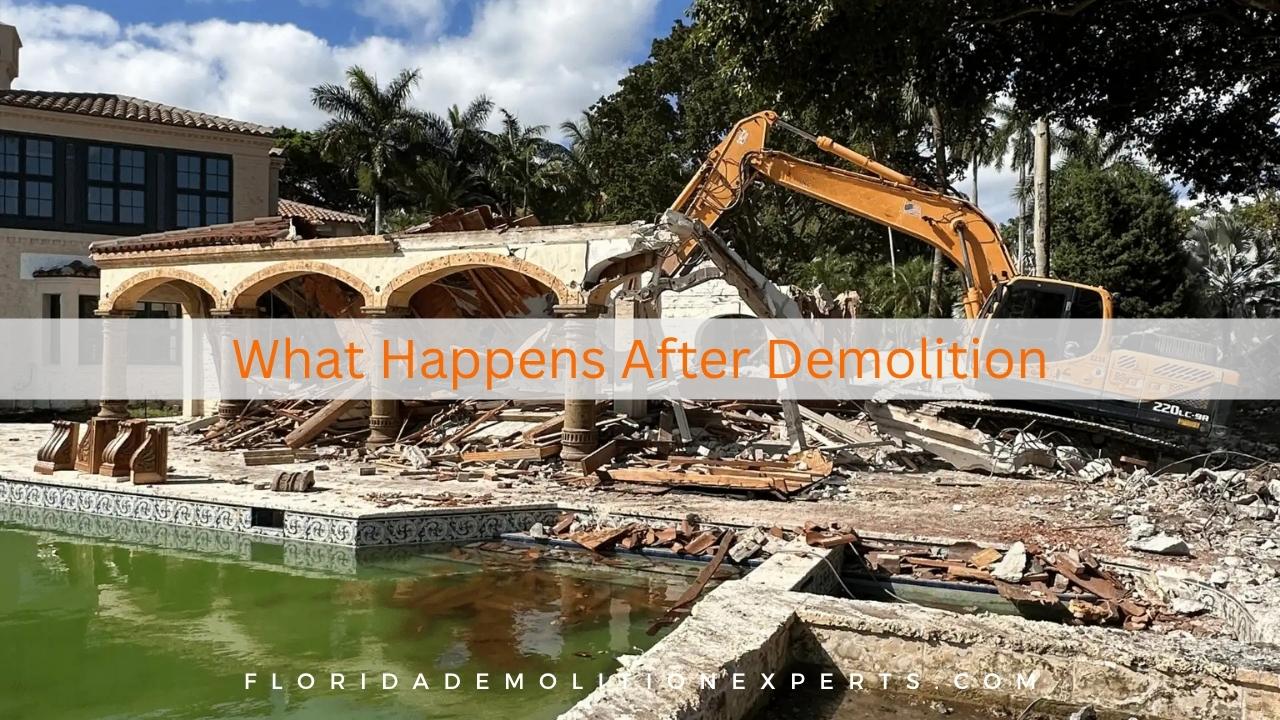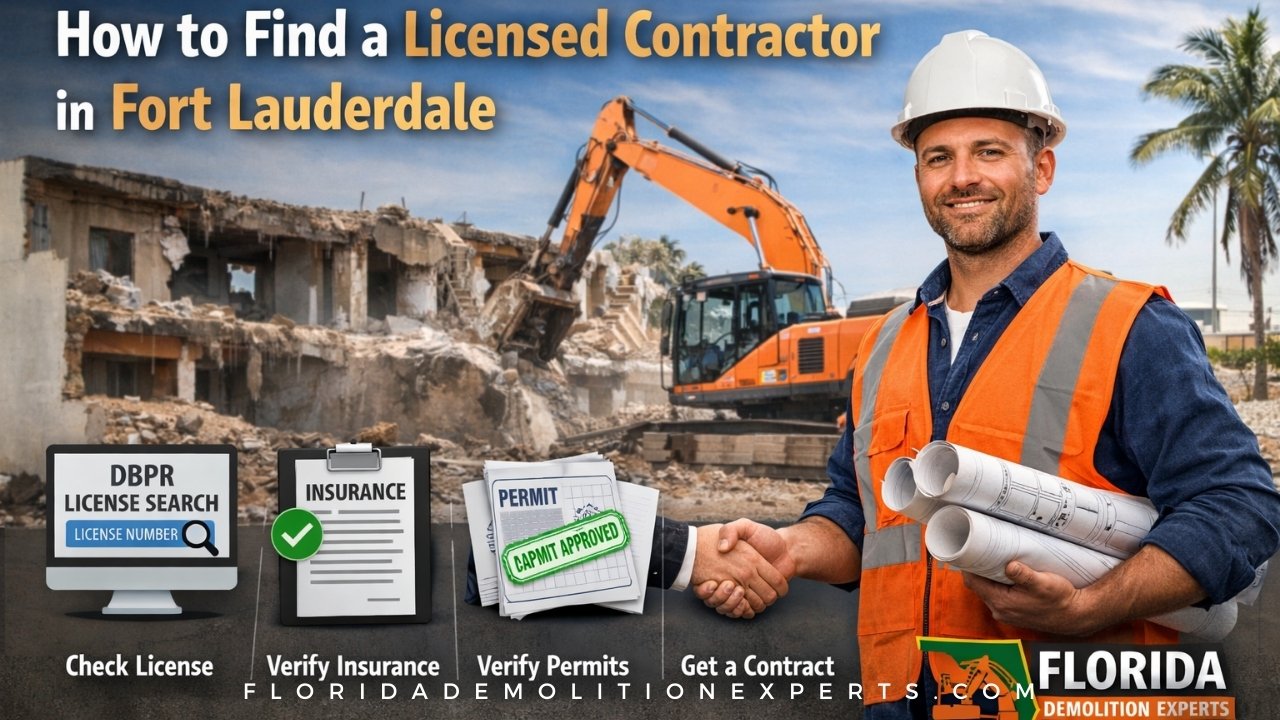Demolishing your old home is a big decision, and while seeing it come down is a significant milestone, it’s only half the journey. Once the dust settles, many Florida homeowners wonder, What happens after residential demolition?“
From cleaning up the debris to leveling the land and reconnecting utilities, the steps that follow demolition are just as necessary and often more complicated than expected. Whether you’re planning to rebuild, sell the land, or remove an unsafe structure, knowing what comes next will help keep your project safe, compliant, and moving forward smoothly.
Just Demolished a House? What Comes Next.
Tearing down an old or unsafe home is a significant milestone but does not end the project.
Homeowners in Florida often ask:
- What happens to the debris?
- Can I build right away?
- Who prepares the land for construction?
- Do I need more permits?
👉 This guide explains exactly what happens after demolition, whether you’re rebuilding your dream home, installing a new structure, or prepping land for resale. For a full breakdown of the entire process from start to finish, check out our Residential Demolition in Florida: Complete Guide to Process, Costs, and Permits.
1. Debris Removal: Clearing the Site Safely
Once the demolition is complete, all leftover debris must be removed quickly and correctly.
Here’s what typically happens:
- Concrete, wood, brick, and roofing are loaded into dumpsters
- Recyclable materials (like metal and concrete) are sorted
- Waste is hauled to approved landfills or recycling centers
Note: Your demolition contractor should include debris removal in the scope of work. Always confirm before signing a contract.
2. Site Grading: Preparing the Ground for What’s Next
Grading is the process of leveling and stabilizing the land after demolition.
It includes:
- Filling in holes and uneven areas
- Smoothing out the soil
- Creating proper drainage slopes
- Compacting the land for future construction
Proper grading prevents flooding, erosion, and foundation issues during rebuilds.
3. Utility Disconnection & Reconnection
During demolition, all utilities must be disconnected. Afterward, they must be capped, inspected, and safely reconnected.
Key utilities include:
- Water and sewer lines
- Gas lines
- Electricity
- Internet or cable
Work with licensed professionals and check local regulations for inspection requirements.
4. Soil Testing & Environmental Checks
Before building begins, many cities and counties in Florida require:
- Soil compaction testing
- Environmental clearance (especially if there were hazardous materials)
- Land surveying for zoning and building compliance
These tests ensure the land is safe and stable for construction.
5. Permit Verification and Compliance
After demolition, it’s critical to ensure all permits are closed adequately with your local Florida building department. Final inspections may be required to confirm debris removal, utility disconnections, and code compliance. Missing this step can delay your new construction permit.
You may also need to submit documents like utility cut-off proofs or environmental clearances. Partnering with an experienced contractor helps ensure smooth compliance and prevents costly delays during the rebuilding process.
6. Post-Demolition Timeline: How Long Does It Take?
| Phase | Estimated Time |
|---|---|
| Debris Removal | 1–5 days |
| Grading & Site Prep | 2–7 days |
| Utility Reconnection | 3–10 days |
| Soil/Environmental Tests | 1–3 weeks |
| Permit Approval (Rebuild) | 2–6 weeks |
Timelines may vary based on your city or county.
7. Final Inspections Before New Construction
Before you can start building on your cleared site, most Florida municipalities require a final inspection of the demolition work and site conditions. Inspectors will verify that all debris has been removed, utilities have been safely capped or rerouted, and the land has been properly graded and stabilized.
Documentation must be submitted if soil testing or environmental remediation is needed. Passing this final inspection is essential for obtaining new building permits and moving forward with construction plans. Always schedule this inspection early to avoid delays in your rebuild timeline.
You can begin your next project once the site is clean and level.
Common options include:
- Building a new custom home
- Installing a detached garage or ADU (accessory dwelling unit)
- Creating a garden, patio, or open space
- Holding the land as an investment
Depending on your location, you’ll need new building permits, architectural plans, and possibly impact fees.
Pro Tip: Choose a Contractor Who Manages Start-to-Finish
Some demolition contractors stop after the teardown.
But the best providers, like Florida Demolition Experts, manage the entire project, including:
- Debris removal
- Land grading
- Utility coordination
- Rebuild prep
- Permit assistance
This saves you time, money, and headaches.
FAQ’s
What comes after demolition?
After demolition, the following steps typically include debris removal, site grading, and utility capping or reconnection. If you plan to rebuild, you must pass final inspections, verify permit closure, and prepare the site for new construction. These steps ensure the land is safe, level, and ready for development.
What happens after demolition?
Once a structure is demolished, contractors clear the debris, level the land, and prepare utilities. Depending on your location in Florida, you may also need soil testing, permit verification, and environmental clearance. Only after these tasks are completed can new construction begin legally and safely.
What are the effects of demolition?
Demolition clears old or unsafe structures but can also impact the environment if not done correctly. It creates dust, noise, and debris, which must be managed carefully. Proper demolition improves property value, enhances safety, and opens up space for redevelopment.
What are the risks of demolition?
Risks include injuries from falling debris, exposure to hazardous materials like asbestos or lead, property damage, and permit violations. Therefore, hiring licensed professionals who follow Florida safety codes and environmental regulations during residential demolition is essential.
Why Choose Florida Demolition Experts?
- Trained, licensed, and experienced demolition crews
- Full-service site cleanup and grading
- Local expertise with Florida permitting and environmental rules
- Fast turnaround, fair pricing, and safe practices
👉 Call now or request a free site evaluation to get started on your next project.
Let’s turn that empty lot into a fresh start.






